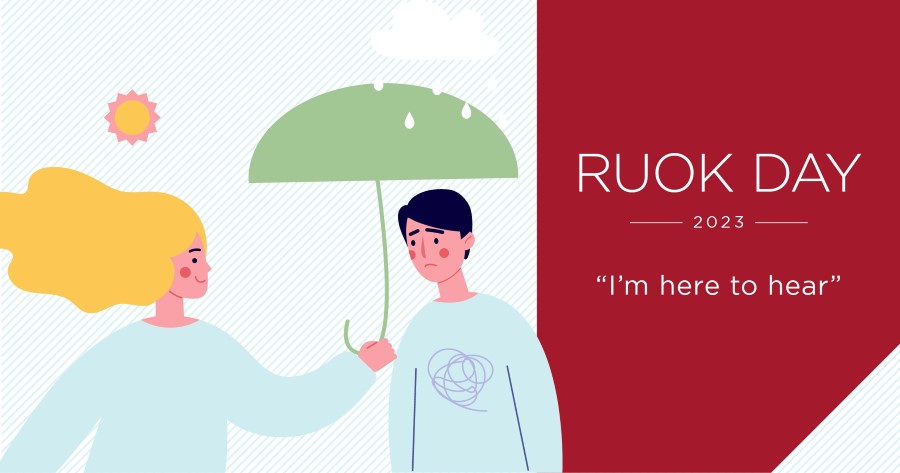
On R U OK? Day today, workers are being urged to act with CARE if a colleague responds: “No, I’m not OK.”
The CARE acronym offers a step-by-step guide to having a conversation that is purposeful, useful and fruitful, says psychologist Anica Vuckovic Taione, of Employee Assistance Program (EAP) Telus.
“It can be difficult to respond to someone who says: ‘No, I’m not OK’,” she added.
“We might see the situation as a threat which could activate our ‘fight or flight’ response and make us less resourceful.
“We might feel panicked and think: ‘What do I do?’. Our logic and problem-solving abilities may become inhibited.
“Therefore, having a conversation using the CARE Plus Model is helpful.”
The steps involve:
C: Noticing changes in behavior
A: Asking and actively listening
R: Referring to support
E: Encouraging action
+: Following up
Noticing a change in a colleague’s behavior is usually the first indication that something is amiss.
Changes can be physical (tiredness/headaches); cognitive (indecisive, negative); emotional (irritable/moody) and behavioral (less motivated/not wanting to go to work).
They are usually apparent before the individual says they’re not OK.
“It’s important to be observant and to keep an eye on your colleagues,” Mrs Vuckovic Taione said.
“Often, they won’t admit they’re not OK because they’re worried about their job or how they’ll be perceived.
“If we do notice something, then we would ask them if they are OK — and actively listen.”
“Listening actively rather than trying to fix the problem is the best approach if a colleague says: ‘No, I am not OK’,” Mrs Vuckovic Taione said.
“Focus your concern on their wellbeing. You don’t want them to feel attacked on a personal level.
“Asking ‘how can I support you?’ can be very powerful.”
Plan what you might say or do, and choose an appropriate time and place.
“No one wants to be confronted in front of others,” Mrs Vuckovic Taione said.
“Ensure you have enough time for a genuine conversation.”
“It’s important to remember your role is not that of a counsellor or a psychologist, so if you feel you’re not best placed to support the individual after actively listening, refer them to other modes of assistance,” Mrs Vuckovic Taione said.
“These can include internal avenues such as their manager or People and Culture (P&C) or Work Health & Safety (WHS) teams or external support, such as their EAP.
“If you are getting someone else involved, disclose it to the person you are helping rather than doing it behind their back — to maintain their trust.
“And, remember, set clear boundaries for yourself to ensure you’re safe.”
You could set up a wellness plan together, keeping the actions simple and tangible.
Share a positive story if you’ve sought support yourself and encourage the individual to continue engaging with their manager/P&C/WHS.
After you’ve had a conversation, follow up with the colleague — casually or formally.
Remind them you’re there for them, and make time for a coffee or a chat. If either of you work remotely, a phone conversation or a message can be beneficial.
“Bear in mind, this shouldn’t keep you worrying 24/7, which can be exhausting and deplete your resources,” Mrs Vuckovic Taione said.
Try these conversation starters:
“I’ve noticed you haven’t been yourself lately; is there anything I can do to support you?”
“I just wanted to check in to make sure everything is all good.”
“I’ve been thinking of you and wanted to know how you’ve going since we last chatted.”
“It’s not about trying to solve the problem and immediately having an answer; it’s quite the opposite,” Mrs Vuckovic Taione said.
“It’s about being curious, understanding where that person is coming from and what’s happening for them and doing what is in your capability to help.”
Stay calm.
“If you suspect a colleague may be at risk of hurting themselves and you feel confident, you may ask them: ‘Are you having thoughts of harming yourself?’” Ms Vuckovic Taione said.
“Don't fear that asking such a question is suggestive, that you’re putting ideas in their mind. Research shows the opposite is true. It actually makes the individual feel there is someone there to support them. They might need someone to open up to. You can save someone’s life by offering support.”
If the answer is yes, take the situation seriously and offer support, keeping yourself safe in the process.
“Rather than thinking of people being mentally ill or mentally healthy, consider mental health as a continuum ranging from needing extra support to thriving,” Mrs Vuckovic Taione said.
“We are usually somewhere in between, depending on what’s going on in our lives.
“In our teams, we might have people who need to be supported or someone who is not OK who we can support but may also need external support.
“Fostering good rapport among colleagues and a culture of trust and psychological safety within an organisation makes it easier to have an RUOK? conversation.
“We all need help in our lives. No one is invincible or bullet-proof.”
Ai Group’s WHS Consulting team can help you to identify the critical psychosocial risks which may cause burnout and stress within your business and assist you to manage them through surveys, risk assessments and prevention plans. Contact Ai Group’s WHS team at safety.services@aigroup.com.au.
Click here for more information on Psychosocial Hazards.
Business responds to rising costs of mental health issues

Wendy Larter is Communications Manager at the Australian Industry Group. She has more than 20 years’ experience as a reporter, features writer, contributor and sub-editor for newspapers and magazines including The Courier-Mail in Brisbane and Metro, the News of the World, The Times and Elle in the UK.